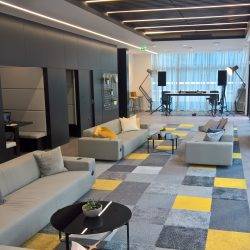To provide the best experiences, we use technologies like cookies to store and/or access device information. Consenting to these technologies will allow us to process data such as browsing behaviour or unique IDs on this site. Not consenting or withdrawing consent, may adversely affect certain features and functions.
The technical storage or access is strictly necessary for the legitimate purpose of enabling the use of a specific service explicitly requested by the subscriber or user, or for the sole purpose of carrying out the transmission of a communication over an electronic communications network.
The technical storage or access is necessary for the legitimate purpose of storing preferences that are not requested by the subscriber or user.
The technical storage or access that is used exclusively for statistical purposes.
The technical storage or access that is used exclusively for anonymous statistical purposes. Without a subpoena, voluntary compliance on the part of your Internet Service Provider, or additional records from a third party, information stored or retrieved for this purpose alone cannot usually be used to identify you.
The technical storage or access is required to create user profiles to send advertising, or to track the user on a website or across several websites for similar marketing purposes.
 Stress can be caused by numerous factors, but work often isn’t the main culprit, according to a report from The Health Insurance Group. The company runs regular forums for their staff to discuss their mental wellbeing, and life outside work consistently ranks as the biggest cause of stress. As businesses look to support the mental wellbeing of their staff, it’s important they recognise that support needs to extend to home life too – not just work. (more…)
Stress can be caused by numerous factors, but work often isn’t the main culprit, according to a report from The Health Insurance Group. The company runs regular forums for their staff to discuss their mental wellbeing, and life outside work consistently ranks as the biggest cause of stress. As businesses look to support the mental wellbeing of their staff, it’s important they recognise that support needs to extend to home life too – not just work. (more…)




















 UK-based
UK-based 


 The UK’s regional cities are competing harder than ever with London to become the location of choice for the tech sector. According to CBRE’s report
The UK’s regional cities are competing harder than ever with London to become the location of choice for the tech sector. According to CBRE’s report 










April 11, 2019
What lift design tells us about who we are and how we work
by Mark Eltringham • Comment, Facilities management, Workplace design
(more…)